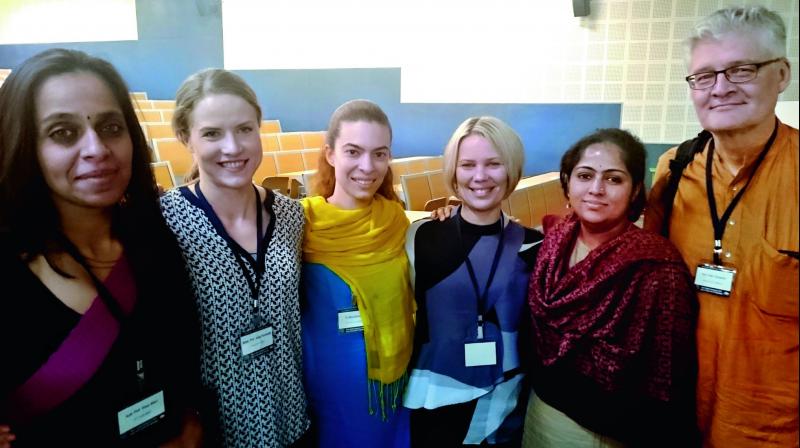The road to musical recovery

It is a universal belief that music paves the way for relaxation, leading any human being into a peaceful state of mind. Even Indian scriptures underscore the sedating effect of music, stating that its sweet essence can be experienced by all creatures big and small — from an infant to a giant animal and from a teenager to a snake. Music has the power to touch, reform and influence the entire creation.
In this light, Prof Suvi Saarikallio from the University of Jyväskylä, Finland spoke about the increased need for using music as a therapeutic medium at the Music Cognition Symposium in the city. Organised by the Centre for Cognitive Science at International Institute of Information Technology (IIIT)- Hyderabad, the session focused upon the potential of musical engagement in helping depressed adolescents.
Says Suvi, “Studies have shown that adolescents tend towards music listening as a means of escaping and avoiding problems, troubled relationships, sadness, anger, negative energy and frustration. Listening to music arouses them emotionally and provides entertainment and solace. However, not all results have given positive outcomes and research is still on about the best practices that can be adopted.”
During the event, Dr Shantala Hegde from the National Institute of Mental Health and Neuro Sciences (NIMHANS), Bengaluru, spoke about the intervention of music in helping alzheimer’s, dementia and stroke patients. “Rhythm plays an important part in facilitating and inducing natural movement in the body. This has helped several patients in the recovery of lost mental functions or impaired functions following a brain injury,” says Dr Hegde.
Prof Vinoo Alluri, faculty coordinator at the Centre for Cognitive Science at IIIT-Hyderabad, spoke about the first steps taken in Hyderabad towards the research for understanding musical listening habits among a cross section of people in India. Stating that the research would further help in the practice of music therapy, he says, “Scientific research with the help of engineering technology to analyse and interpret data can help in creating mental well-being through music therapy.”
Further, Prof Preeti Rao from IIT-Bombay spoke about the importance of Indian classical music and its impact to further the cause of music therapy. Also present at the event was Secunderabad-based Rajam Shanker, a practicing Indian classical music therapist for over 20 years. In collaboration with medical and rehabilitation professionals in Hyderabad, Chennai, Bengaluru, Mumbai and New Delhi, Rajam deals specifically with autism, curative education, healing and associated neuro-developmental disabilities in children and adults.
“Most ancient civilisations, such as Middle-Eastern, Indian, Asian and Oriental, have substantial centuries-old evidence about the use of their various genres of indigenous music as mediums of both mood management and therapeutic intervention. My own personal intervention methodology is using notes, pitch, scales and beats, which are the components of Carnatic music. Even though there is a lot of development and research on music therapy seen in the West, we in India still do not have a single representative national music therapy association or even a dedicated academic programme offered by any university,” concludes Rajam.

